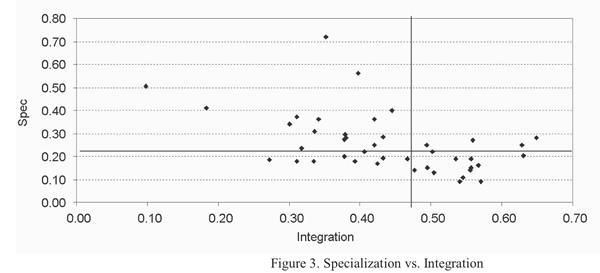Lecture 4: Considering an interdisciplinary and innovative career
Presentation
- Assumptions:
- ESR PhD students are likely to have careers that will draw from multiple disciplines in order to solve problems.
- The problem of "interdiscplinarity" is actually a bigger problem in academia that it is in the other sectors.
- Innovation may face some of the same challenges in other sectors (as interdisciplinarity does in academia).
- Who and how knowledge is created is a legitimate concern for environmental science.
|
Why we need interdisciplinary studies and solutions
NSF report on Transitions and Tipping Points
- from 2006/2011 strategic plan
- integrative research that serves as a strong foundation for policy
- need to understand transition and tipping points will require multiscale approaches
- increasing stress + little time + need for new science that provides solutions
- high priority for NSF is the IGERT program
- networked research
- other good examples: MEA and decision theater
Discuss:
- "integrative" vs. multiple valid perspectives
- network - how do they really work
- people have to have an authentic stake in the outcome
- depend on trust
- digital & vitrual tools - do they work?
|
Challenges to interdisciplinary academic career
- hiring and review at universities
- Pfirman 2005, only 16% had policies in place for hiring and promotion
- may hire between disciplines but the review for tenure depends on disciplinary criteria
- tenure committee - does it include an outside reviewer
- criteria for how the reviews take place are critical (joint committee, etc.)
- SoE by-laws say that faculty are only considered for tenure in one department, i.e. their home department
- CEDD report
- structural
- institutional acceptance
- a different search process, more people involved
- early career development - such as networking
- 3rd year and tenure review criteria
- senior faculty development rewards above department level
- research
- networking costs - need to establish collaborations and have them come to fruition in < 6 years
- teaching
- co-teaching a course actually requires more total work than if one person teaches it. Does the university really want inter-disc courses?
- may require different pedagogy
- service
- small programs have high overhead that falls to new faculty (my study on small department issues)
- interdisc facuty are valuable on university committees (as are women and minorities) - can lead to "extra" committee work
- more women and minorities attracted to interdisc areas
|
Career paths
- Individual choices
- interdisciplinary is "less efficient" in terms of publication than disciplinary
- refer to discussion on paradigmatic science
- Porter et al. Specialization vs. Integration
- quote "Research spirals inward; science cascades outward."
- Specialization to Integration
- hi - lo = disciplinarian
- hi - hi = single interdisciplinary specialists (essentially empty)
- lo - hi = renaissance integrator
- lo - lo = grazer

- paths to get there over your career
- across and up - building up collaborations
- straight across - specialize and integrate?
|
Innovation
Factors that contribute to innovative students/employees
- multi-cultural, have lived in another country
- cognitive flexibility in the face of ill-structured problems
- speaks English - Richard Florida, creative people have access to a wealth of un-regulated information sources and wider range of business outlets
- I shaped vs. T shaped
- I shape career is deep and narrow
- T shape is solid and broad exposure but also have an area of expertise
|
Diverse teams
- Maybe you don't need to be interdisciplinary but you need to learn to work as part of a team?
- Page 2007 notes
- research data showing functional groups beating single geniuses
- "Diversity Trumps Ability" hypothesis
- works because of the superadditivity of tools, combinations of new approaches
- when to copy when to innovate
- diverse groups can avoid local optima
- a person's ability to contribute increases if they can see the problem in multiple ways and can apply diverse heuristics
- functional diversity - different tools
- values diversity - see the problem differently
- practical application - can hire and manage a diverse workgroup easier than you can hire and attend to a single star
|
Activities
1. summarize opinions on what makes a good interdisciplinary or integrative scientist and career
2. discuss proposed list of speakers
2. craft the questions that they might be expected to answer (framework)
|
Follow-up notes
from the discussion
|
|

